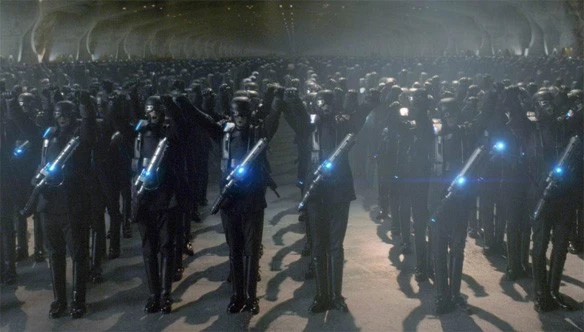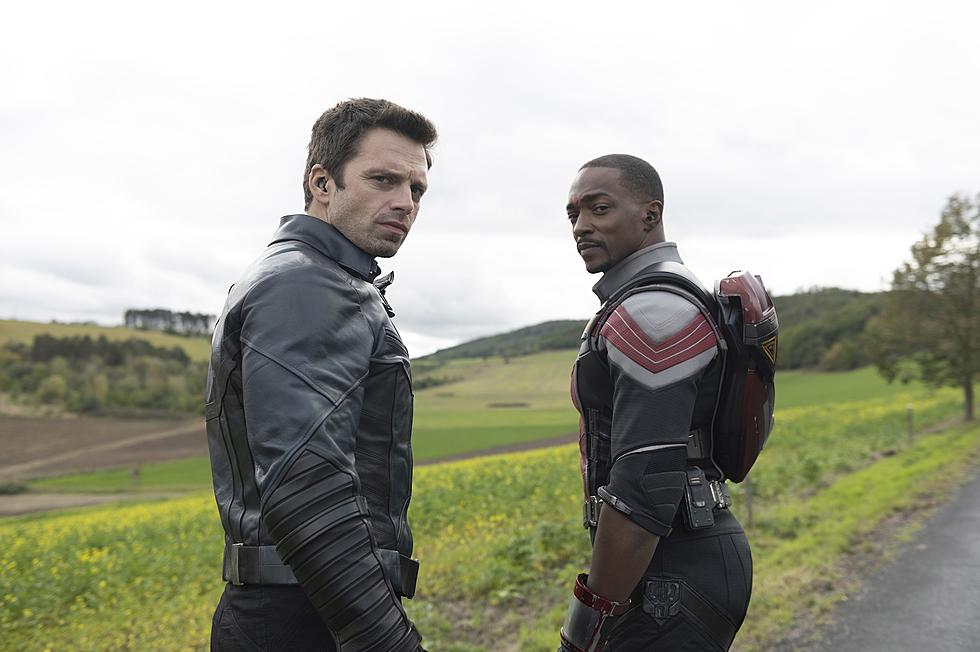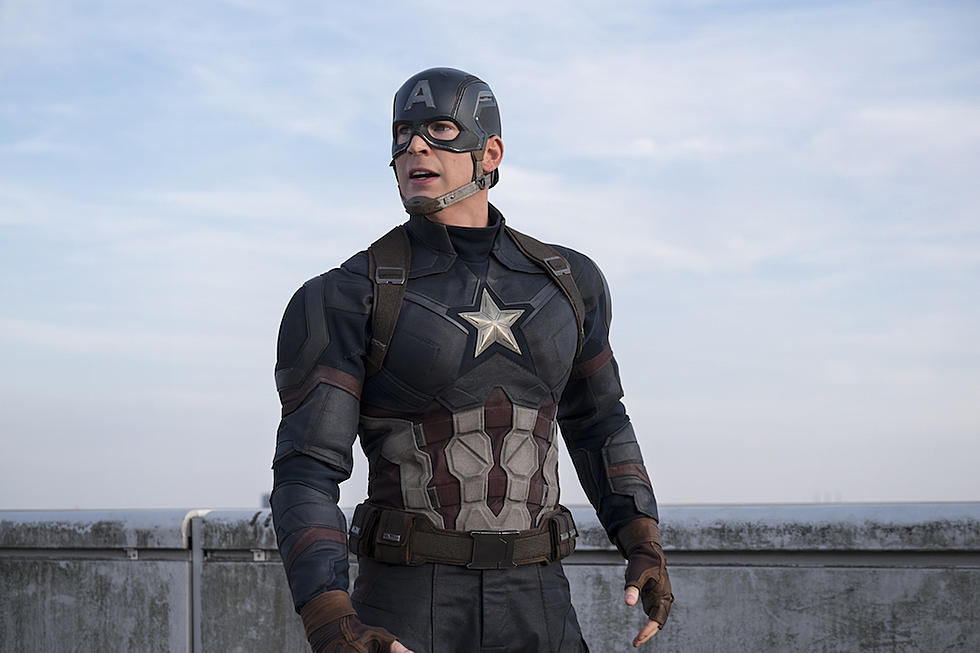![‘Captain America: The First Avenger’ Movie is the Fantasy Version of World War II [Review]](http://townsquare.media/site/622/files/2011/07/cap01.jpg?w=980&q=75)
‘Captain America: The First Avenger’ Movie is the Fantasy Version of World War II [Review]

The very first time we see Steve Rogers, the skinny kid who becomes the title character of Marvel's Captain America: The First Avenger, he's reading about American casualties in World War II as he waits in line to enlist for the army. The guy next to him puts down his own paper and says "They sure are killing a lot of our boys over there. Kind of makes you think twice about enlisting, huh?"
Steve's response, as he puts down his own newspaper and stands up: "Nope."
It's a simple exchange, but the economy involved in that exchange, the beauty of one question and a one-word answer that tell you exactly what this character is all about and how well the producers of the film understand his motivation, shows exactly what makes The First Avenger such an enjoyable experience. That line is, of course, spoken by Chris Evans -- or at least, the half of Chris Evans that wasn't digitally removed to create the 98-pound weakling that he spends the first act of the movie playing -- who delivers it with a genuine conviction. It's not an isolated incident, either; he manages to pull off a surprising sincerity throughout the movie, working with the material to build a Captain America who feels like... well, like Captain America.
That line is, of course, spoken by Chris Evans -- or at least, the half of Chris Evans that wasn't digitally removed to create the 98-pound weakling that he spends the first act of the movie playing -- who delivers it with a genuine conviction. It's not an isolated incident, either; he manages to pull off a surprising sincerity throughout the movie, working with the material to build a Captain America who feels like... well, like Captain America.
I say it's surprising, but it probably shouldn't be. After all, the dude's actual job is to pretend to be different people, but at the same time, I never would've thought that a guy who played Johnny Storm -- let alone the smarmy Lucas Lee of Scott Pilgrim -- could pull off Captain America so well. But the things he says, and more importantly the way he says them, make you believe that he believes them, and that might just be the most crucial piece of making a movie like this work.
More than any other character, and especially in the larger context of The Avengers, Captain America has to be a guy who can deliver a convincing speech and rally people around to follow him. He has to be a guy who you can believe that even the God of Thunder would follow into battle, a guy with convictions that are unshakable even in the face of ultimate evil, and more than anything else, that's what The First Avenger gets right.
One of the keys to this is that everything Steve Rogers does in this movie is a distinct choice of putting the safety of others above himself. As seen in the trailer, he chooses to throw himself on a grenade to save the soldiers around him during boot camp, but it goes deeper than that. He chooses to try to get into the Army five times -- falsifying his hometown every time he's rejected so that he can get another shot -- even when friends and recruiters are telling him that he'd be killed pretty much immediately. When he finally gets the Super Soldier Serum and the government attempts to make him into a spokesman rather than a soldier -- complete with a team of chorus girls, a Vaudeville Hitler, and a rousing, patriotic propaganda tune that's actually pretty brilliant -- he chooses to go AWOL on a one-man mission to save soldiers that hate him. And at the climax, he chooses to sacrifice himself (Spoiler Warning: He lives) in order to stop the Red Skull's master plan.
It's simple stuff, but it's a consistent display of heroism that makes Captain America so easy to like and respect, and Evans latches onto those parts of the script that could easily come off as hokey or cliche and just sells them perfectly. There's another scene early on that former Captain America writer Mark Waid said made him "cry with joy," when Dr. Erskine asks Steve if he wants to go kill Nazis, and Steve responds by saying "No. I don't want to kill anyone. I just don't like bullies." That answer makes you understand why this guy has to be the one who becomes Captain America.
That said, he does kill the hell out of a bunch of Nazis.

Except that they're not actually Nazis, which leads to the most interesting aspect of the movie. The villain of the picture is, of course, the Red Skull (played with just the right amount of over-the-top evil by Hugo Weaving), who starts off as the head of the Nazis' R&D division, Hydra. Before long, though, the Skull and his chief henchman, Arnim Zola -- a character that I honestly thought I would never see in a movie, even if he doesn't have his TV-stomach-face here -- have split themselves off into a renegade splinter group with their own army of jackbooted thugs. It's even revealed that the Skull has plans to wipe Berlin off the map, which means that this is a movie where Captain America and Hitler have a common enemy.
Essentially, the movie creates a villain that's even Nazier than the Nazis for Captain America to fight, trading in brown shirts and swastikas for Hydra's tentacles and black leather outfits right out of a Call of Duty game.

I don't necessarily think this is a bad thing, but it's absolutely fascinating because the end result is a movie set during World War II that's ostensibly about World War II, that hits a point where it barely has anything at all to do with World War II.
That's the reason the whole idea of Captain America carrying a gun and shooting enemy soldiers, and especially one brief moment where he actually uses an enemy as a human shield, stick out as off in this movie. As a comic fan, I think we've all come to terms with the idea that Capt killed his fair share of Nazis, because those stories exist within the context of World War II, and it's easy to make a case for it. He's a soldier, and they're not only enemy soldiers, but they're Nazis, the most indefensible, irredeemable, definitive villains of the 20th Century, if not all of recorded history. Cap shooting them and blowing up their tanks works fine if you're reading a war story, or in this case, if you're seeing a war movie.
But the thing is, this isn't a war movie. In fact, it abandons all pretense of being a war movie about halfway through, when the Red Skull builds his toyetic army of laser-troopers and H.I.S.S. tanks.

Those are motorcycles with laser-guns mounted on them. Seriously.
Even the look of the movie divorces itself from the period. The Red Skull's Asgardian science magic that powers his weaponry also apparently gives him the ability to make his soldiers look like they're from 70 years in the future, and the same goes for Howard Stark's revolutionary uniforms for Cap and the Howling Commandos. It becomes a fantasy movie that uses World War II solely as a backdrop, in the same way that Lord of the Rings uses British accents and cloaks as shorthand for "this is a movie where guys use swords and magic."
Without the context, or even the visual cues, of World War II the bad guys stop being enemy soldiers and start being super-villain henchmen, and while the line between those two might seem insignificant and imperceptible, it's there. I can deal with Captain America killing Nazis during World War II, but pulling a henchman in front of him to take a magic laser bullet isn't heroism.
But at the same time, I don't think recontextualizing the events is necessarily a bad thing, which is what's so fascinating about it to me. By introducing Hydra and tying it into Asgardian magic and Howard Stark (using the elements of the other Marvel movies almost as elegantly as Thor did), this movie is doing what super-hero movies have to do: It's creating a universe where these characters and events can and must exist. As much as I think it loses sight of the period aspect when the Red Skull puts on his Hellraiser-esque leather trenchcoat/evening gown, the movie is unapologetically presenting a view of what World War II would've looked like in the Marvel Universe, bringing in all the magic and super-science that that universe allows.
It's unquestionably the super-hero universe version of World War II, and in that respect, it couldn't work any other way. This is a movie so deeply tied to the Avengers franchise that the words "The First Avenger" are in the title, and the now-familiar post-credits scene that the Marvel movies have been using as their trademark isn't really a "scene" at all this time -- it's a straight-up trailer, complete with a tagline. It's a full-on piece of a franchise that's building a shared continuity in a way that movies have never really done before, and it shouldn't be anything else but a super-hero movie. The only problem is that it tries to have those two contrary aesthetics working at the same time.
But really, the rest of the movie is so enjoyable that it's easy to overlook that flaws that need to be ironed out. Even beyond Evans and Weaving, the cast is great, there's an enjoyable inversion of the traditional relationship between Steve Rogers and Bucky Barnes, the romance between Cap and Peggy Carter feels well-done and suitably tragic, there are nice nods to Marvel continuity that include a surprising cameo by the Golden Age Human Torch, and the end titles are absolutely fantastic.
As easy as it would've been for Captain America to turn into a two-hour ad for next summer's Avengers -- and as much as there are parts of it that certainly fit that bill -- it's genuinely entertaining, and its take on the character is spot on.
And hey, if nothing else, it's a lot better than last time.
More From ComicsAlliance









